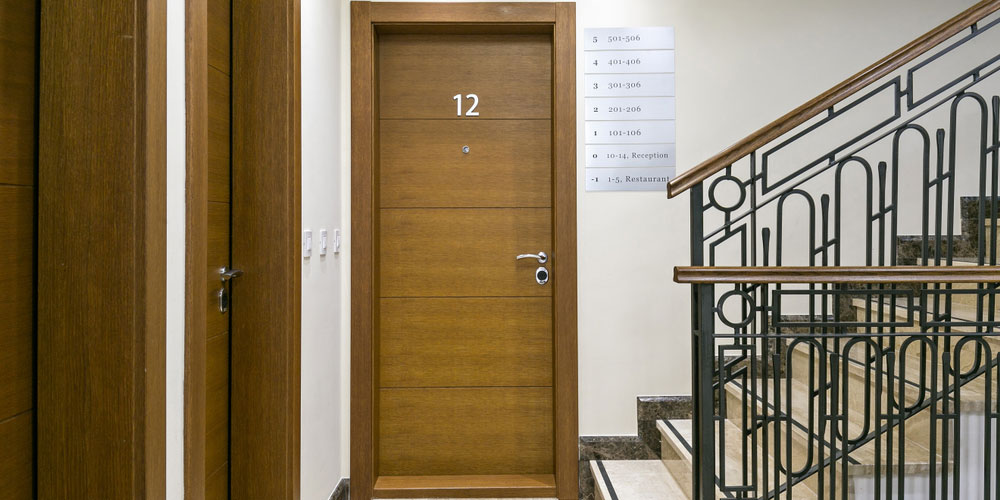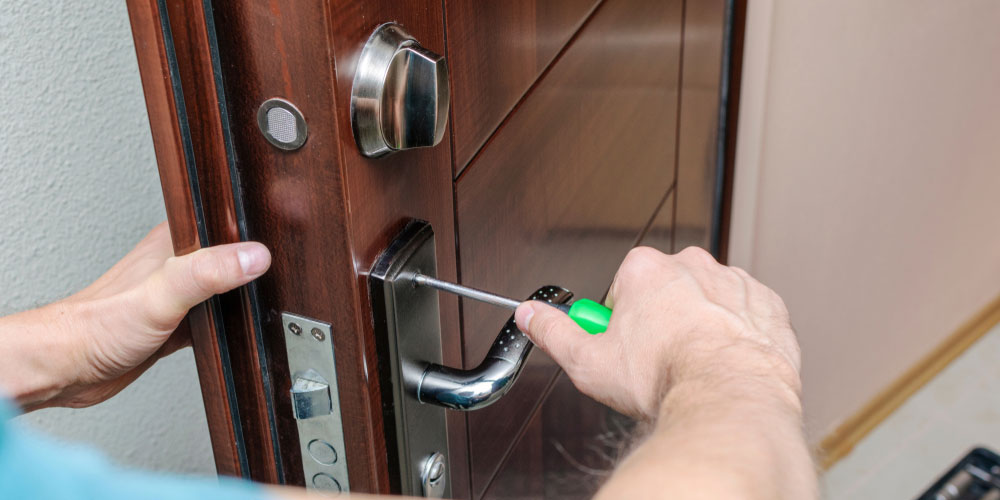Lock Blog
A resource for consumers, locksmiths, and security professionals
A resource for consumers, locksmiths, and security professionals

The question, “Can I change the locks on my apartment?” does not have a clear and concise answer due to the variety in local laws, state laws, and lease variations. However, there is some broader wisdom that can be used to find out if you can change the locks on your apartment. Together, we will go through the general prevailing truths about changing locks in an apartment.
The obvious disclaimer is that none of this is intended as legal advice. This is a locksmith blog. Our strength is in doing the actual changing of the apartment locks, but we do our due diligence to get you the information you need as it pertains to security-related topics. Just keep in mind, any answer we provide as to whether you can change the locks on your apartment may not apply to you.
The answer to, “Can I change the locks on my apartment,” is determined by:
In most states changing or rekeying locks is not a legal requirement when a renter moves out and a new tenant moves in. However, even without the legal onus placed on the landlord, a lease or renter’s agreement can still stipulate a responsibility to change locks. If no such stipulation is made in the lease, the renter may find a service provider and pay out of pocket.
It will depend on why the service is being refused, but in most cases, a tenant will be allowed to change the locks on their apartment at their own expense as long as they provide the landlord with the new key. If the property manager is explicitly prohibiting you from changing your apartment locks yourself, consult your lease and local laws for the proper recourse.
Landlords will almost always have the legal right to request a duplicate key from their renters but at the landlord’s expense. Unless you have reason to believe giving your landlord this type of access will put you in danger, it will be to the renter’s benefit. This access gives landlords the ability to help you when you are locked out of your apartment and do maintenance when you are not home.
Handling the labor of changing the locks in an apartment is often a good tactic to convince a frugal landlord to make improvements to your living situation. The fewer expenses the property owner will accrue as a result of changing apartment locks, the more likely the work is to get done in a timely manner.
Check to see if there is a specific clause in your lease or rental agreement that details out the requirements for changing locks. At the very least you should communicate that you are doing this so the landlord can know whether they need to request a key. In many cases, the rental agreement is going to provide the final word on this issue.
Installing a fresh lock on an interior apartment door, which currently uses no lock is often perfectly acceptable. If this is restricted, there will be explicit wording in your lease, renters agreement, or zoning codes. Often a deadbolt or keyed door knob will be approved, whereas a padlock may be prohibited because, during an emergency, it can only be opened from one side.
The easiest way to add security to an existing door is to replace the set screws for the door hinges and strike plate with 3-inch screws. This will better protect against brute force attacks such as kicking and bludgeoning. Metal slipcovers can also be added around the existing lock hardware so the door is less vulnerable where most material was removed.
Changing the style and key profile for your apartment lock may be a problem if the building utilizes a master key system. Also, you will likely need to give a copy of the key to your landlord, so key control is diminished. As key control is one of the reasons to buy a lock from the top high-security lock brands, this undermines the purchase.
It is unlikely that your patio is a point of entry, so a landlord will not need a key to enter during an emergency. However, you should still check with your property manager before going forward with a patio door lock replacement. If you are worried about security, improving the security of your window glass will be more beneficial.

In terms of documentation that details your rights, the best place to start is with your local legal statutes. This information is publicly available, and for your reference should be gathered first-hand from government websites (.gov). Feel free to use supplemental articles to decode the language, much like we have done with lock pick laws.
Unfortunately, getting a hold of these jargon-riddled documents is often not the best way of understanding the law around changing apartment locks. There may also be contradicting statutes between the state and city levels. So what do you do to sort out the confusing and sometimes contradictory messages?
When in doubt, consider how much changing the lock on your apartment is contributing to your safety. Then consider what you could do to make the process as simple as possible for your landlord. Communicate your issue as plainly as possible. What is your problem? How will it be solved by changing the lock on your apartment?
You can also simply get the approval of your landlord, regardless of anyone’s legal responsibility. Instead of asking the property manager, “Can I change the locks on my apartment door?” you can rephrase. Say instead, “If I cover the cost to change locks, can I change the locks on my apartment door?” Or make the case that the price of rekeying locks is less expensive.
Key Takeaways:
In many cases, the state law takes precedence over the lease, but in the case of states like New Jersey and California, the law is to defer to the lease. That means a lease may be able to absolve property owners of existing legal responsibilities or make renters accountable for things like apartment lock changes.
However, when anything is not expressly stated in the lease agreement, responsibilities revert to what is outlined in the legal statutes. And in cases where neither the lease nor the law prescribes an explicitly liable party, determine whether or not the problem with your lock is affecting the habitability of the space before asking the landlord, “Can I change the locks on my apartment?”
For example, a stuck door latch may be an inconvenience or it could be keeping your front door from locking properly. Because door handles offer very little security, unless they are keeping deadbolts from engaging properly, this is not a pressing concern. If you want to change a door knob that is unkeyed, this will not affect access but your landlord should still be notified.
Key Takeaways:
In most cases, the landlord only has the right to change apartment locks as soon as the lease ends. This also means that they are not allowed to rekey or change locks until the end of the lease even if the renters move out. But the landlord is legally permitted to change the locks before the lease officially ends if they have the express permission of the vacating tenants.
The general answer to a landlord asking, “Can I change the locks on my apartment?” is do not do it without a court order or expressed consent from the tenant. There may be certain emergency situations where consent does not apply exclusively when the apartment lock change is for the benefit of the tenant, such as after a home burglary.
If you are responding to a home invasion where the apartment door and/or lock has been broken, it needs to be replaced. Even without damage, when it is clear that an unauthorized individual has entered the property, you don’t need to ask if you can change the locks on the apartment. When you can’t tell if the lock has been picked, assume a key was used.
Key Takeaways:

As a tenant, your rights revolve around the livability of your accommodations. In the most extreme of situations, having non-functional or compromised locks will affect the habitability of a property. This is perhaps an overly flowery way of saying, if a lock is broken or someone untrustworthy has a key, you should change the locks on your apartment.
In the event that your locks are diminishing your safety or creating an active threat to your health or property, you likely have the grounds to demand a lock change. If you are denied a provision for your living accommodations after expressing the clearly articulated need for such a provision, then your landlord can be held liable for damages if they do not fix the issue.
Many states do not require landlords to change locks when someone new moves in, but this potentially puts them at risk for the cost of damages. Because house keys can so often be easily copied, the previous tenant may retain access to the property. You should have the right to change the locks on your apartment if your current locks create any kind of vulnerability.
Key Takeaways:
The most professional and dynamic option for an apartment lock change is a locksmith. In this case, you will be looking for a residential locksmith. Even though an apartment complex might seem like a commercial structure, the apartments themselves use residential locks. You only need a commercial locksmith if you are working on the perimeter or administrative areas of the building.
To reduce the cost of hiring a locksmith you can use a rekeying service instead of a full lock change, which requires purchasing new lock hardware. You will also have access to the knowledge and experience of a security professional. The work will be done correctly and your new lock options can be determined based on lock prices versus the security they offer.
Often, building management will outsource the labor of changing an apartment lock to a locksmith company, but the property manager will handle the hiring and appointment. They almost certainly have a relationship with a local locksmith that specializes in the common residential door locks used in the apartment complex.
When you are asking, “Can I change the locks on my apartment gate or perimeter,” you need to get building management involved. Malfunctioning or dangerous locks in the apartment complex, such as a gate lock or other perimeter security points, must be addressed. This will fall into the category of commercial door lock replacement, but it is still a door lock that is putting tenants at risk.
When you are handling the front door lock replacement yourself, be very careful that you do not improperly install the hardware. If tolerances are too tight, the lock can bind which can lead to sticking and even jamming. If the lock has been changed too many times, the set screw holes may be worn down to the point where new hardware will no longer securely fasten.
When possible it is best to leave apartment lock changes to the professionals. You do not want to risk your security deposit or your safety by finding the answer to the question, “Can I change the locks on my apartment myself?” is a resounding “No I cannot.” However, there are other ways to protect your apartment that you can investigate into doing yourself.
So you ask again, “Can I change the locks on my apartment?” Yes, but renters have to talk to their landlord to make sure this does not create any problems between the two of you. If changing your apartment locks is going to solve a problem, such as fixing a bathroom door that won’t open or a jammed door lock, then your landlord should provide some type of assistance.
Category: Residential, Safety & Security